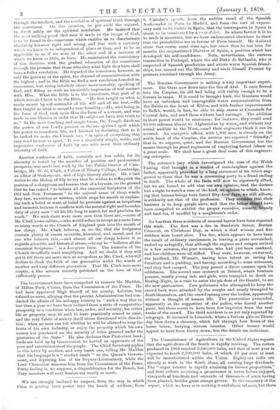Another confession of faith, certainly not less noble, for its
sincerity is tested by the sacrifice of position and professional prospects, was made last week by the late Public Orator of Cam- bridge, Mr. W. G. Clark, a Fellow of Tirinity College, Cambridge, an editor of Shakespeare, and of high literary ability. Mr. Clark writes to the Bishop of Ely to say that he wishes to reNnquish the position of a clergyman and resume that of a layman, on the ground that he has ceased "to believe all the canonical Scriptures of the Old and New Testament" in the natural sense of those words. Any law, unwritten or written, which stops his mouth in explain- ing such a belief or want of belief he protests against as iniquitous and immoral, because it conflicts with the natural right and bounden duty of every man "all his life long to search for and proclaim the truth." We wish there were more men than there are,—more of Mr. Clark's own calibre,—who would refuse to accept as a mere form so many words as the Church of England puts into the month of her clergy. Mr. Clark believes, as we do, that the Scriptures contain plenty of errors scientific, historical, and moral, and for one who believes this,—and almost all our clergy believe it as regards scientific and historical errors,—to say he "believes all the canonical Scriptures" is a deceptive form. The formulas of the Church dreadfully want simplifying. And we doubt if they will get it till there are more men as scrupulous as Mr. Clark, who will decline to cloak the faith of one generation under the words of another and very different generation. That Mr. Clark is no mere sceptic, a fine sermon recently published on the love of God sufficiently proves.










































 Previous page
Previous page